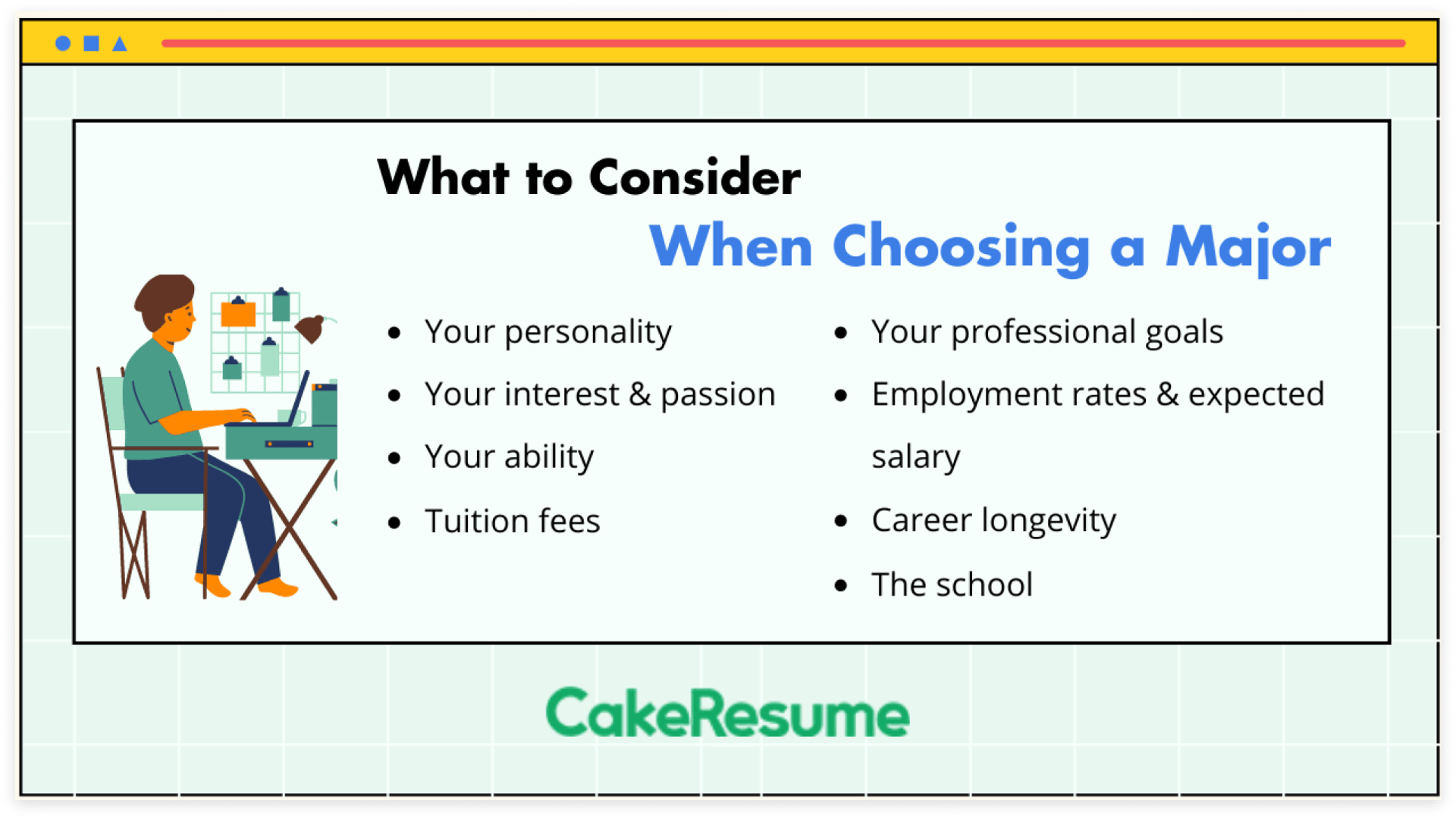What Do I Major In? A Comprehensive Guide

In this article, we'll cover:
If you’ve begun your academic career, you might be struggling to pick a major. It’s common for students to begin university without a clear idea of what to major in, and typically, students will change their major at least once during their degree.
Choosing a major is an important step in your degree because it dictates what to study in college and could set you on your career path. Although it’s impossible to predict how your career will unfold, the choice of your major will expose you to specific subjects and, thus, lead you toward certain careers. Choosing a major early on is important because it will help you to take the prerequisite courses needed to graduate. If you start your degree before picking a major, you risk missing important prerequisites and potentially prolonging your time in school.
What to Consider When Choosing a Major
Figuring out what to study in college can be a tough decision, but it doesn’t need to be stressful. There are a few factors to keep in mind to make picking a major more straightforward.
🎓 Your personality
If you’re wondering what to major in, your first consideration should be personality. Who you are informs your interests and strengths, which are important to think about when choosing a major. Picking the right career and major for your personality type can help you achieve greater success.
🎓 Your interest and passion
Perhaps the biggest factor to consider when you are choosing a major is your interest. You should be invested in what you’re studying, so try to pick a major that will keep your interest and passion throughout your degree and beyond. You can’t go wrong by considering subjects related to your passions when you’re choosing a major.
🎓 Your ability
If you’re wondering how to decide what to major in, it’s important to keep your abilities in mind. Try to be realistic about your strengths and weaknesses. Some majors have prerequisite courses that might not fit your skills, which could create a challenge for you to graduate.
🎓 Tuition fees
Keep tuition fees in mind when choosing a major. Depending on where you live, post-secondary education can be incredibly expensive, and some majors could incur higher costs. For example, you might need to pursue postgraduate studies in your field to secure a job, or you could have unexpected course fees, like a co-op. Your finances and tuition fees can have a big influence on how you pick a major.
🎓 Your professional goals
Consider your career goals if you don’t know how to choose a major. Even if you don’t have clearly defined professional goals, you likely have an idea of what direction you would like to go in. When choosing a major, think about what’s most applicable to the field you want to work in, and remember that even if you change careers later, many majors have transferable skills.
🎓 Employment rates and salary expectations
If you’re wondering what to major in, it’s important to think about what you expect from your future career. Choosing a major in a field that is highly competitive or overcrowded might be a poor investment after you graduate. Similarly, think about what kind of salary you expect to have after graduation and whether you’ve picked a major that will meet your expectations.
If salary is your number one consideration when picking a major, look at which majors lead to the best-paid careers. For example, nine of the fifteen majors with the highest salaries are in engineering. If, however, you are more concerned with finding work after graduation, doing some research on employment rates could help you choose a major. For instance, the five majors with the highest unemployment rates are mass media, liberal arts, anthropology, philosophy, and construction services.
🎓 Career longevity
When choosing a major, you also need to think about how long you can be in your chosen career after graduation. Some jobs have a short shelf life, because of physical limitations or high rates of burnout. You are investing money and time into your degree, so if your career will be short-lived, you may want to pick a major with more long term options.
🎓 The school
While deciding what to major in, it’s important to consider the school you’re attending. Some schools are well known for certain majors, while other programs and departments are less well-funded. It might therefore help to pick a major before applying to schools. If you are already enrolled, consider what programs your current school has to offer.
What to Do When You Don’t Know What to Major In
Since choosing a major is a tough decision, it’s quite possible you still don’t know what to study in college after carefully considering the factors mentioned above. There are a few different resources and ideas to help you in picking a major.
📝 Advisors/counselors
A good first step in choosing a major is to speak to an academic advisor or career counsellor. Most post-secondary and high schools offer academic advising, and you could also find low-cost options in your community. A counsellor can talk to you about your interests and expectations to discover what major you would be well-suited for. Although they won’t tell you what to do, their advice could be instrumental when you don’t know how to decide what to major in.
📝 Peers
Your peers can help you choose a major because they might have ideas or information you hadn’t considered before. They are also in the process of choosing a major and feedback on their own decision could help you with yours.
📝 Family members
Your family members are another resource that can help you decide what to major in. They have valuable life experience and may have even struggled with their career and education choices. Your family also knows you well and can give you ideas or help you pick a major that suits your personality and skills.
📝 Personality quiz
A great way to pick a major is to take a personality quiz. Different personality types are better suited for certain careers and knowing your type can help you choose a major. There are a variety of personality tests you can take online.
- Myers-Briggs: The Myers-Briggs personality test gives you one of 16 different personality types, and sites like this one show you what careers and majors are best for your type.
- 16 Personality Factor Questionnaire: The 16PF Questionnaire is a personality test based on the Big-Five Personality Model. With your results, you can use the 16PF Career Development Report to compare your personality type and assess ideal careers, to help you pick a major.
📝 “What should I major in” quiz
If you don’t feel a personality quiz has helped you pick a major, you can always take a more direct test. These types of quizzes suggest what to study in college based on your test results.
- Career Cruising: It’s likely your school has access to the Career Cruising site, which has several assessments related to career and education. The results section for each career provides an education roadmap that can help you pick a major.
- Your School: Many college and university websites offer major quizzes, like this one from Anderson University. If you don’t know what to major in, this quiz is a good place to start. Try your school site to see what quizzes they offer to help you in choosing a major.
What If You Still Don’t Know What to Major In?
If you have exhausted your existing resources and still don’t know what to major in, you still have some ways to postpone your decision or leave your options open. Here are a few ideas to help you if you still can’t choose a major.
✅ Choosing a flexible/general study major
Many colleges and universities offer general study or liberal arts majors, which are a good option if you are still choosing a major. By keeping your options open in the beginning, you are free to pick a major later, when you have a better idea.
✅ Considering a minor
If you still can’t pick a major, a less stressful recourse you have is choosing a minor. Your minor doesn’t need to be in the same field as your major. Whether you’ve declared a general study major or chosen a major you’re still not sure about, you can use a minor to explore your passion and interests.
✅ Taking electives
Like choosing a minor, taking electives can expand the things you study in college and help you discover your passions. Your electives can be unrelated to your major and they may set you on an entirely different academic path. Taking different electives can help you choose a major by revealing avenues and interests you haven’t considered before.
✅ Examining the possibility of switching majors
If you’ve picked a major you are no longer passionate about, or if you’re still not sure, you could consider switching your major. If you have the right prerequisites, this switch might be relatively painless. Otherwise, you might have to do an extra year or two of school to take the required courses. Still, it is better to consider switching than to graduate with a major you don’t care about.
Reality Check
Choosing a major can feel like a big decision, and it’s not something to do thoughtlessly. It’s important to be realistic about what you want out of your degree and how choosing a major will impact your future.
Things to ask yourself before you pick a major:
- What do I know about this major and/or career?
- Why am I choosing this major?
- Am I a strong student in this subject?
- How long will I be in school, and can I make that commitment?
- Are my professional goals realistic and attainable?
- Will I be able to find work after I graduate?
- Have I spoken to anyone who took this major?
🔑 Key Takeaways
Choosing a major is an important decision that can cause a lot of stress. “I don’t know what to major in” is a common concern for many students pursuing post-secondary education. Before you pick a major, you should carefully consider your goals and personality to make sure your decision is in line with your interests. If you don’t know what to major in, you could start by choosing a general study major or take a quiz to help narrow your options down.
When choosing a major, it’s important to ask yourself difficult questions and be honest about what you want from your degree. Remember that you’re not alone, and most students experience this uncertainty when they try to pick a major. If nothing else, a little time and experience can help you make this big decision.
With CakeResume, you can easily create a resume online, free download your resume in PDF, and utilize ATS-compliant templates to create a resume. Create your resume online (free download) now and land your dream job!
--- Originally written by Tiffany Quinn ---
More Career and Recruitment Resources

With the intention of helping job seekers to fully display their value, CakeResume creates an accessible free resume/CV/biodata builder, for users to build highly-customized resumes. Having a compelling resume is just like a piece of cake!






